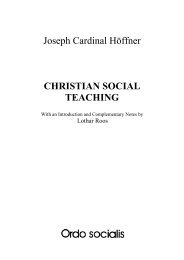Prof. Franz Josef Stegmann Bethlehem Social ... - Ordo Socialis
Prof. Franz Josef Stegmann Bethlehem Social ... - Ordo Socialis
Prof. Franz Josef Stegmann Bethlehem Social ... - Ordo Socialis
You also want an ePaper? Increase the reach of your titles
YUMPU automatically turns print PDFs into web optimized ePapers that Google loves.
<strong>Stegmann</strong><br />
3.2 Basic equality, of human beings<br />
A second essential of Christian understanding of the human being is no less important for<br />
shaping a human society. Contrary to the huge social, cultural and political differences in<br />
those times, the Bible emphasises the fundamental equality of all human beings who without<br />
exception are children and images of the same creator. In addition, the New Testament attributes<br />
special significance to this equality, in particular for the community of the faithful:<br />
"There is no difference between Jews and Gentiles, between slaves and free people, between<br />
men and women; you are all one in union with Christ Jesus" (Gal 3,28), the apostle Paul<br />
writes to his friends in the churches of Galatia.<br />
It is difficult to imagine today the significance of such a statement, in times when a woman<br />
was only regarded and recognised as a second-class human being and a slave was not judged<br />
as a human being at all. The demand emanating from such a statement has concrete<br />
consequences for political ethics and for the action of a Christian: ie, each human being -<br />
people of different beliefs, races and gender, the sick, the unborn as well as the elderly -<br />
enjoys the same dignity and equal rights. The relevance of this truth to shaping a human social<br />
order in view of the present situation almost throughout the world is obvious.<br />
3.3 Main Christian attitudes - "Eschatological reservation"<br />
A further example of what belongs to the Christian conception of the human being and what<br />
is important for shaping a human society has already been mentioned. Jesus proclaimed the<br />
eschatological promises of liberty, justice, peace and reconciliation as the very core of his<br />
salvation. Consequently, liberty, justice, peace and reconciliation are basic Christian attitudes.<br />
They are, of course, not only Christian attitudes, but they oblige Christians and challenge<br />
them in particular. These "eschatological promises of salvation" force every Christian to take<br />
on social responsibility. They cannot be individualised; there is no liberty, justice, peace and<br />
reconciliation for the single individual only. By nature, these promises are related to the social<br />
life of human beings living together, to the community. Those who want to be Christians<br />
muss therefore be committed to a free and just society and to peaceful human coexistence.<br />
On the other hand, the eschatological aspect of these promises should not be overlooked.<br />
Jesus proclaimed that liberty, justice, peace and reconciliation will come to their fullness in<br />
his heavenly kingdom.<br />
"They cannot be simply identified with conditions of an earthly society here and now."<br />
This "eschatological reservation" 24 forbids making absolute utopias of any kind; it warns<br />
against any "social utopianism" - even if utopias might be imperative. Human beings need<br />
visions and utopias as incentives in order to strive for targets. But human actions - and<br />
therefore political and economic actions as well - always are and always will be temporary<br />
and incomplete.<br />
3.4 "New quality" of ethical rules<br />
The biblical message - and consequently the Christian understanding of the human being -<br />
give ethical rules a "new quality". What does “new quality" mean in this context?<br />
As far as I can see, three points of view can be distinguished: one aspect refers to the theology<br />
of creation, a second to the theology of redemption and, finally, an eschatological perspective.<br />
24 Metz, Theologie der Welt, 105, 110 (see note 19).<br />
14















